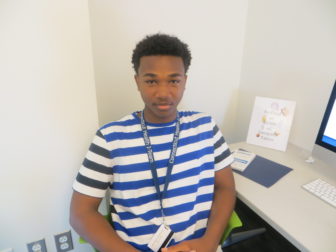The University of Connecticut men’s basketball team has dramatically increased its Academic Progress Rate (APR) over the past six years, surpassing the national average, according to the NCAA.
The APR is the NCAA’s measure of eligibility, retention and graduation for Division I student-athletes. In 2012, because UConn had fallen below the required four-year rolling average of 930, a postseason suspension was imposed on the Huskies and they were forced to sit out the NCAA tournament.
UConn, known for being so good on the court, was criticized for failing too often in the classroom, according to media reports.

Tariq Ligon
However, in the past few years, UConn’s men’s basketball APR has increased dramatically, and it recently earned a perfect APR score of 1,000, compared to the national average of 967, according to the NCAA.
It is actually the third time in four years that the Huskies have posted a perfect APR in the sport. UConn is now about 35 points above the national APR average for men’s college basketball.
Hartford Courant sportswriter Dom Amore, who has covered the men’s basketball team for seven years, said in an interview that he has chronicled how UConn has corrected its mistakes.
“They’re on top of things they were not on top of before and that’s all it took to get the APR score,” he said.
In fact, its APR is now higher than that of the Yale University men’s basketball APR of 987.
Yale is always seen as a great school academically, so UConn passing it is a big deal, Courant sportswriter Desmond Conner said in an interview.
Amore has written extensively about the Huskies’ comeback in the APR and how it has surpassed the rates at some other schools.
Among the state’s Division I programs, UConn had the only perfect APR (1,000), followed by Yale, 987; Quinnipiac University, 980; University of Hartford, 979; Sacred Heart University, 973; Fairfield University, 971 and Central Connecticut State University, 931, according to a report by Amore on courant.com.
Central was just one point above the 930 threshold at which a school is penalized.
Mike Enright, UConn’s senior associate director for athletics/communications, described how the UConn men’s basketball team improved it APR score.
“There is a total commitment to academic success in our men’s basketball program from the Division of Athletics and its Student-Athlete Success Program,” he said. “At the end of the day, the most credit belongs to the student-athletes themselves who have put in the time and hard work to succeed at UConn.”
UConn did put new measures in place to assist the student-athletes, including increased support staff, an academic center in the Werth Family Basketball Champions Center and revised study hall formats, Enright said.
It took “a lot of hard work from the student-athletes and a continued commitment by the Division of Athletics to give them the tools they need to succeed athletically and academically,” he said.
“The APR is one of many tools we have to determine academic performance and success of our student-athletes by sport,” Enright said. “It is a good tool, but also can’t be used in a vacuum. There are many other factors we have to consider ranging from NCAA graduation rates to senior exit interviews we do each year with our student-athletes.”
Amore said, “Usually if there is a difference in APR scores, the difference comes from the amount of academic support. The step that UConn took to improve their APR scores was [to] make sure that they had academic advisors to monitor the students to make sure that they were going to class and doing their homework.”
Colleges typically examine their support staff if players aren’t graduating in large enough numbers, he said.
“If there is an APR problem, the first remedy is we don’t have enough support, and enough staffing to make sure that these things are being done,” he said.
Amore said he does not believe that APR is the best way to measure college athletes’ success.
“It really doesn’t speak to what grades everybody is getting or what classes they are taking,’’ he said. “All it is, is keeping athletes academically eligible and keeping them in the program, so you get points for that.”
Tariq Ligon is a student at Achievement First, Amistad High School, New Haven.